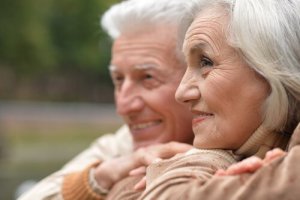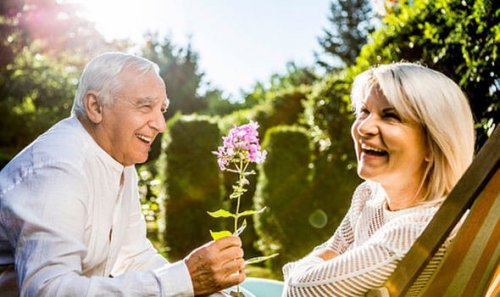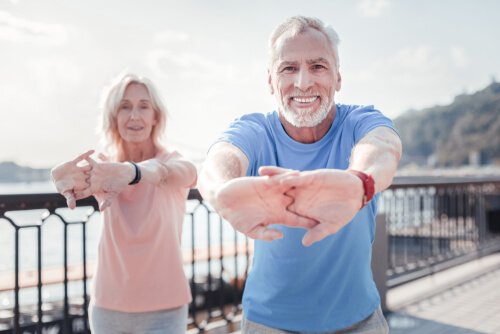Five Keys to Healthy Aging

Nothing can stop time or its effects. Aging is a part of life, and no one should feel ashamed or afraid of it. In fact, life expectancy is increasing, which means that many people are living very long lives. Thus, discovering some keys to healthy aging is very important.
The challenge is to age in a way that allows you to live your remaining years to the fullest. The good news is that although you can’t stop time, there are some tools to minimize its effects.
Many senior citizens live an active and healthy life. Nevertheless, there’s no avoiding the physical and mental changes that come with age. That being said, there are plenty of things that you can do to stay healthy and active as you grow older. In this article, we’ll explain some of the keys to healthy aging.
What is healthy aging?
The World Health Organization (WHO) defines healthy aging as “as the process of developing and maintaining the functional ability that enables wellbeing in older age.” This includes a person’s ability to:
- Meet their basic needs;
- Learn, grow, and make decisions;
- Be mobile;
- Build and maintain relationships; and
- Contribute to society.

As you can see, this functional ability is made up of the individual’s intrinsic capacity, relevant environmental characteristics, and the interaction between them.
- Intrinsic capacity comprises all the mental and physical capacities that a person can draw on and includes their ability to walk, think, see, hear, and remember. The level of intrinsic capacity is influenced by a number of factors such as the presence of diseases, injuries, and age-related changes.
- Environments include the home, community, and broader society, and all the factors within them such as the built environment, people and their relationships, attitudes and values, health and social policies, the systems that support them, and the services that they implement. Being able to live in environments that support and maintain your intrinsic capacity and functional ability is key to healthy aging.
Keys to healthy aging: Living longer and better
Healthy aging isn’t just about living longer, it’s about making the most of your life. After all, your biggest challenge is how to make your remaining years count. What can you do to lead an active, independent, and happy life?
Research shows that there are specific diet, sleep, exercise, relationship, and preventative care strategies that may help improve your quality of life. These factors can help you avoid and prevent chronic illnesses such as arthritis, asthma, diabetes, heart disease, hypertension, and chronic respiratory problems.
Here are some of the most important strategies:
Nutrition and diet
As you age, your body undergoes some significant changes. The food you eat gives your body the energy and nutrients that it needs to function. Consequently, making good diet choices will help you improve your health at every stage of your life and is one of the keys to healthy aging.
Experts recommend drinking a lot of water and healthy drinks to stay hydrated. You should also eat an appropriate amount of good quality, healthy food. What does that mean, exactly? Well, you should watch your portion sizes and avoid sugar, trans fats, processed foods, and additives.
Here are some examples of healthy foods:
- Lean protein (chicken, pork, seafood, eggs, beans).
- Fruits and vegetables.
- Whole grains.
- Dairy products.
- Foods that are rich in vitamin D and fiber but low in fat and sodium.
Healthy sleep habits
Sleeping through the night becomes more difficult as you age. Senior citizens don’t sleep as deeply and wake up more often during the night. That can lead to chronic sleep deprivation.
Sleep deprivation is a serious enemy to healthy aging due to its profoundly negative effects on your physical and mental well-being.
Many studies have discovered a connection between lack of sleep and poor memory, poor health, and a shorter life expectancy. Some of the most serious consequences of sleep deprivation are obesity, diabetes, heart disease, high blood pressure, mood disorders, and immune system dysfunction, among others.
Although it might seem difficult to get a good night’s sleep, there are many things you can do to improve your sleep. For example:
- Avoid caffeine, nicotine, alcohol, and other stimulants that interfere with sleep.
- Avoid eating heavy meals at night.
- Don’t drink too much water before bed to avoid having to get up to go to the bathroom.
- Don’t take naps late in the day and avoid taking really long naps.
- Exercise is also a stimulant, so avoid exercising before bed.
- Go the bed at the same time every day.
- Don’t use your phone if you wake up in the middle of the night.
- Establish and follow a consistent and pleasant bedtime routine.
Exercise
It’s no secret that daily exercise and a healthy diet are very good for your health. Physical exercise can help older adults stay active, independent, and mobile for longer. It also helps prevent certain illnesses.

Physically fit older adults tend to be better at making decisions, thinking critically, and planning. Not only that, but they have fewer cognitive impairment, memory loss, and dementia problems. That’s why exercise is so important for healthy aging.
You don’t have to become an Olympic athlete to get results. Walking or doing some other aerobic activity for at least 150 minutes a week and 2-3 weight training sessions a week, along with daily stretching and balance exercises, is more than enough.
Preventative care
It’s important to schedule regular checkups with your doctor to make sure everything is okay. You should let your doctor know about anything out of the ordinary, even if it’s just that you feel more tired than usual.
“The doctor of the future will give no medicine, but will instruct his patient in the care of the human frame, in diet and in the cause and prevention of disease.”
-Thomas Edison-
Relationships
Staying socially active helps older adults in many ways. According to the National Institute on Aging:
- Meaningful social relationships are associated with positive biomarkers for health.
- Social well-being is associated with reduced inflammation, which helps you avoid problems such as Alzheimer’s, osteoporosis, arthritis, and heart disease.
- Social isolation is a risk factor for morbidity and mortality, especially among older adults.
- Loneliness correlates to high blood pressure.
- Loneliness is a risk factor for depression.
Positive relationships with friends, family members, and coworkers help you live a healthier and happier life. There are many ways to have an active social life. You could volunteer, exercise at the gym, play cards, get coffee with friends, organize family dinners, etc.
An active sex life is also important. Orgasms increase oxytocin and reduce blood cortisol level, which lowers stress and anxiety and helps you sleep better. Sex also keeps you looking and feeling younger.

As you can see, putting all of this advice into practice is the key to healthy aging. It’s never too late to start taking care of yourself. The good news is that you don’t have to do it all at once. Introducing a new habit every month is a great way to start. Before you know it, you’ll have more energy and feel better than ever.
This text is provided for informational purposes only and does not replace consultation with a professional. If in doubt, consult your specialist.








